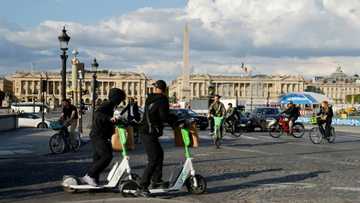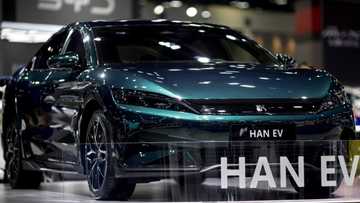Kenya unveils plans for nationwide e-bike scheme

Source: AFP
PAY ATTENTION: Click “See First” under the “Following” tab to see Legit.ng News on your Facebook News Feed!
Kenya unveiled Friday plans to roll out electric motorbikes across the country under a green transport scheme to reduce carbon emissions and pollution.
President William Ruto announced the initiative with African startup Spiro just days before he hosts the first Africa Climate Summit in the Kenyan capital Nairobi next week.
"We are committed to enhancing our climate action by adopting low-carbon and efficient transportation systems through the application of innovations including clean, efficient, and sustainable energy technologies," Ruto said at the launch ceremony in the Indian Ocean port city of Mombasa.
Ruto said Kenya currently had 1,000 of the new e-bikes, with another 10,000 on their way, and that Spiro had established a plant with the capacity to assemble 1,000 of the vehicles daily.
About two million motorbikes are on the roads in Kenya, he said, mostly "boda bodas" or two-wheeled taxis that are commonly used across the continent.
"The adoption of electric mobility is a high-priority intervention to address the challenges of pollution, adverse health effects, and fuel costs," Ruto said.
PAY ATTENTION: Follow us on Instagram - get the most important news directly in your favourite app!
Kenya, he said, aimed to eventually phase out the combustion engine-powered motorbikes, warning that the increasing use of such vehicles across the continent had "serious implications" for climate change and air quality.
Although Africa contributes only two-three percent of global greenhouse gas emissions, it suffers disproportionately from climate change, according to the UN Environment Programme.
Spiro said it has already introduced nearly 10,000 electric bikes in Africa to countries including Benin, Togo, Rwanda, and Uganda.
It said in a statement it plans to set up 3,000 battery charging and swapping stations in Kenya, in addition to 350 already across Africa, with a planned rollout eventually of more than one million electric vehicles throughout the country.
Zero emissions target
On Thursday, the US app-based taxi service Uber announced the launch of its own electric motorcycle taxis in Nairobi in what it said was a first for the company in Africa.
Uber said about 3,000 bikes were planned initially, claiming they would cut running costs for drivers by 30-35 percent and reduce fares by about 15-20 percent.
"This launch also supports our global efforts to become a zero-emissions platform by 2040," Frans Hiemstra, Uber's regional general manager for the Middle East and Africa, said in a statement.
According to the World Bank, the boda boda sector in Kenya employs over 1.5 million young people and contributes about 202 billion Kenyan shillings ($1.4 billion) to the economy each year, the Uber statement said.
Kenya's government has said it is aiming for five percent of all registered vehicles to be electric-powered by 2030.
Currently, the number of registered electric vehicles (EVs) accounts for less than one per cent of the total 4.4 million registered vehicles, according to government figures.
Ruto, who has positioned himself at the forefront of African efforts to combat climate change, said Kenya had the potential by 2030 to generate 100 percent of its energy from renewable sources such as hydro-electric, geothermal, solar and wind power, from more than 90 percent now.
But the country suffers from frequent power cuts.
A massive outage last weekend left several regions without electricity for hours, including Nairobi and its international airport, which was plunged into darkness after a generator serving the main terminals failed.
Fuel prices at the pump have recently soared to their highest levels in more than a decade, adding to the economic hardship of Kenyans suffering from a cost of living crisis and a raft of new taxes.
Source: AFP





